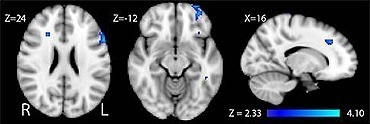Posts Tagged ‘Cerebrum’
Promoting Healthy, Meaningful Aging Through Social Involvement: Building an Experience Corps
(Editor’s note: Pathways responsible for higher-order thinking in the prefrontal cortex (PFC), or executive center of the brain, remain vulnerable throughout life—during critical early-life developmental windows, when the PFC fully matures in the early 20s, and finally from declines associated with old age. At all ages, physical activity and PFC-navigated social connections are essential components…
Read MoreExperience Corps: Promoting Healthy, Meaningful Aging Through Social Involvement
The current issue of Cerebrum –a great publication of the Dana Foundation– includes the excellent in-depth article Promoting Healthy, Meaningful Aging Through Social Involvement: Building an Experience Corps, written by researcher Michelle Carlson: “Over the last decade, scientists made two key discoveries that reframed our understanding of the adult brain’s potential to benefit from lifelong…
Read MoreA Decade after The Decade of the Brain – Educational and Clinical Implications of Neuroplasticity
(Editor’s Note: In 1990, Congress designated the 1990s the “Decade of the Brain.” President George H. W. Bush proclaimed, “A new era of discovery is dawning in brain research.” During the ensuing decade, scientists greatly advanced our understanding of the brain. The editors of Cerebrum asked the directors of seven brain-related institutes at the National…
Read MoreWork (and Juggle) for Cognitive Health
Spectacular article by Dr. Denise Park in this month’s Cerebrum: Working Later in Life May Facilitate Neural Health — “Carmi Schooler at the National Institutes of Health, using a technique that allowed him to assess causal relationships, found that adults who performed intellectually challenging jobs across their life span showed more cognitive flexibility in late…
Read MoreCan We Pick Your Brain re. Cognitive Assessments?
If you could, you would. You can, but prefer not to know it? More than any other organ, your brain is up to you. You are what you think, not just what you eat. Here’s some food for thought: Design your Mind Setting cognitive and behavioral goals raises challenging and worthy questions: What do you want from…
Read MoreThe Future of Computer-assisted Cognitive Behavioral Therapy
The Wall Street Journal had a very interesting article yesterday, titled To Be Young and Anxiety-Free, focused on the value of cognitive behavioral therapy to help children with high levels of anxiety learn how too cope better and prevent the snowball scenario, when that anxiety grows and spirals out of control resulting in depression and…
Read More

